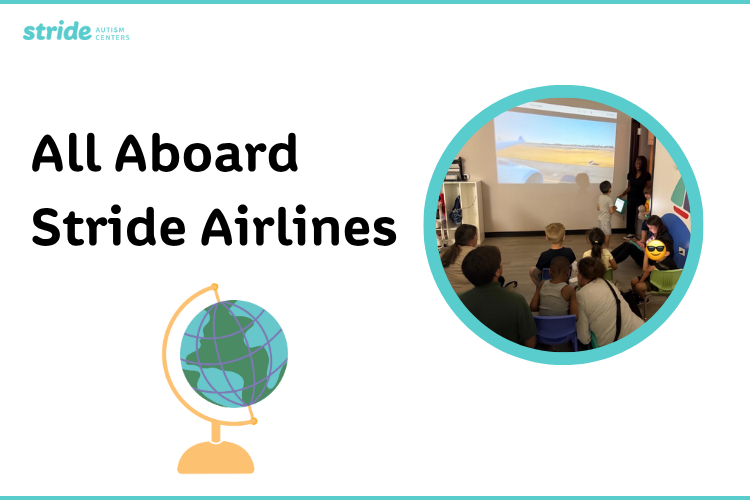At Stride Autism Centers, therapy isn’t just effective, it’s joyful, playful, and deeply thoughtful. That spirit is on full display each summer at our Hickory Hills, Illinois clinic, where an imaginative and therapeutic tradition has taken flight (literally!) for three years running.
Welcome aboard Stride Airlines, a flight simulation experience designed to help young children with autism feel more comfortable with the idea of flying. What began as a personalized intervention for one client has since blossomed into a beloved annual event, one that brings smiles, snacks, and some serious skill-building to our summer programming.
From One Client’s Needs to a Whole-Clinic Tradition
The tradition started when Emily Rodman, a Board Certified Behavior Analyst (BCBA) at Hickory Hills, was supporting a child who felt anxious about flying. With a summer vacation approaching, Emily worked closely with the family to prepare him for the experience.
“We created custom social stories, connected the family with TSA Cares, and introduced role-playing to help him understand what to expect,” she explained. “To bring it to life, we set up a full simulation of a flight, from boarding to snack service.”
The impact was so positive that the team decided to make it a yearly event for all Stride clients at Hickory Hills.
A Journey With Therapeutic Purpose
While the flight simulation is packed with fun, it’s rooted in meaningful therapy goals. During the simulation, children practice:
- Receptive language skills, like following directions (“Come here,” “Sit down”)
- Group participation, such as sitting with peers and engaging in a shared activity
- Waiting and transitioning, through lining up to “board” and remaining seated during the “flight”
- Requesting and choice-making, like picking between snack options or asking for help
“The kids get to practice real-world behaviors in a setting where they feel safe and supported,” Emily shared. “This makes it easier to carry over those skills to actual experiences outside of Stride.”
Bringing the Magic of Flying to Life
Thanks to a little help from Emily’s fiancé, who works for a major airline, the experience feels extra real. He provides authentic first flight wings, activity books, and airline snacks that make the simulation feel just like the real thing.
“We prepare boarding passes, simulate airport lines, and even announce the destination, this year, the kids flew to Hawaii!” said Emily. “They love choosing their snacks, flipping through their activity books, and earning their wings.”
Children boarded a pretend aircraft, took their seats in rows, and listened carefully as staff made flight announcements. Some even peeked out imaginary windows as the “plane” took off.
Why It Matters
For many children with autism, new experiences, especially those that involve transitions, crowds, or unexpected sensory input, can feel overwhelming. That’s why Stride prioritizes real-world readiness in our programming.
By embedding life-skill preparation into engaging and joyful experiences, our team helps children gain confidence, build tolerance for new environments, and learn how to navigate situations that they’ll likely encounter in their day-to-day lives.
“Our approach at Stride is always guided by each child’s clinical goals, but we also know how important it is to make learning fun,” said Emily. “The flight simulation is a perfect example, it’s play-based, highly motivating, and full of learning opportunities.”
The Stride Difference
At Stride, we believe that therapy should feel meaningful and magical. Whether it’s simulating a flight, exploring a pretend grocery store, or participating in seasonal crafts and celebrations, our team is constantly designing activities that balance structure with joy.
And while the kids may think they’re just having fun on their way to Hawaii, we know they’re also practicing skills that will serve them for a lifetime.
We’re already counting down the days until Stride Airlines takes off again next summer, and we can’t wait to see where our clients venture to next.


